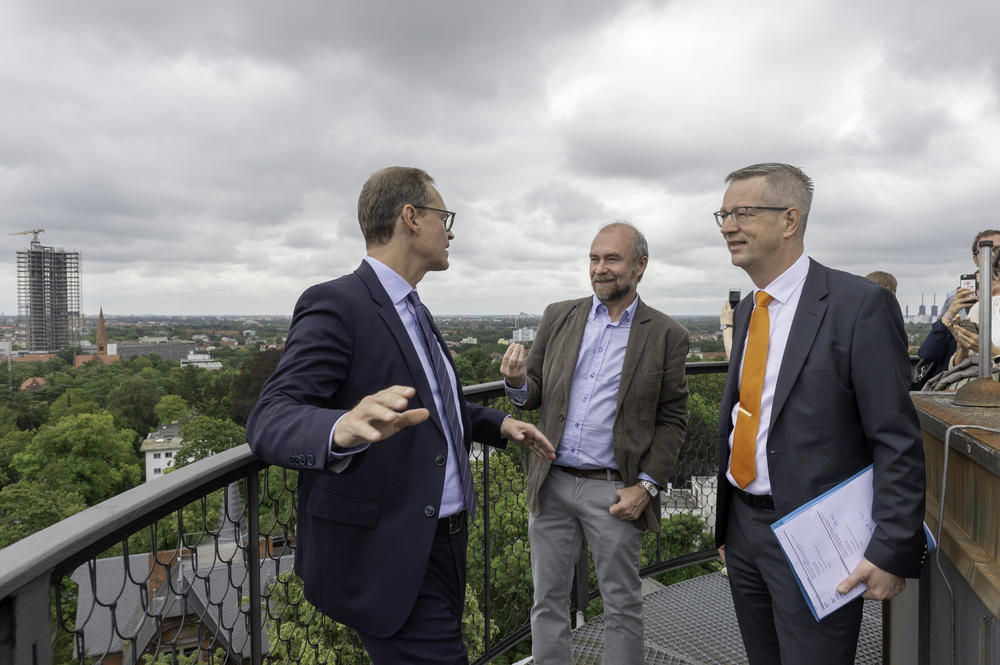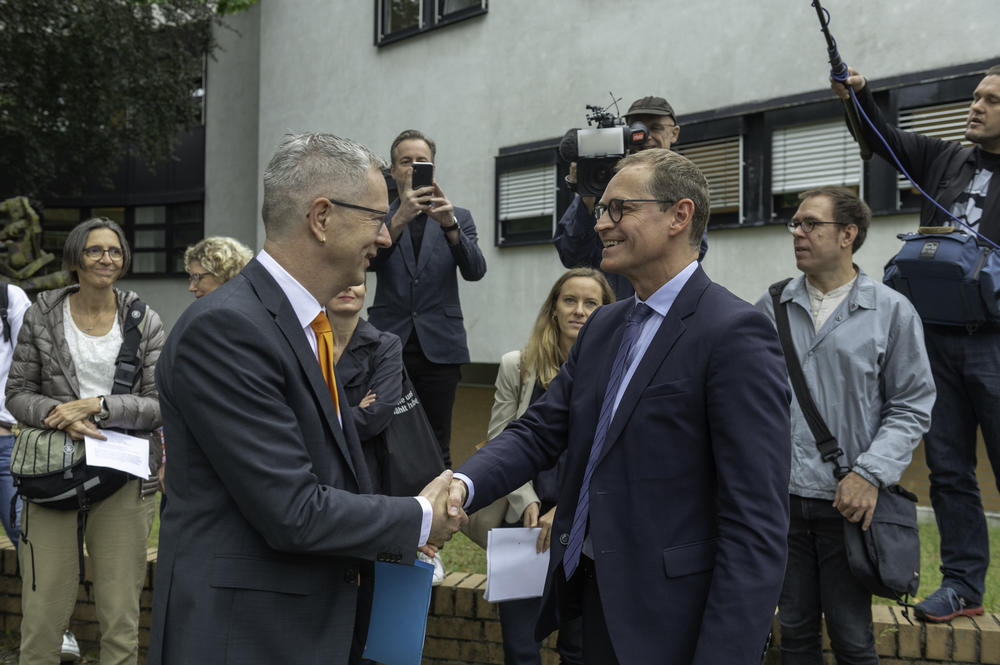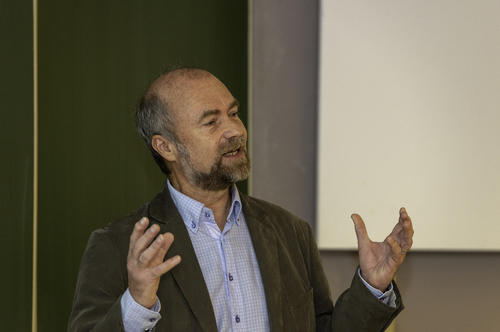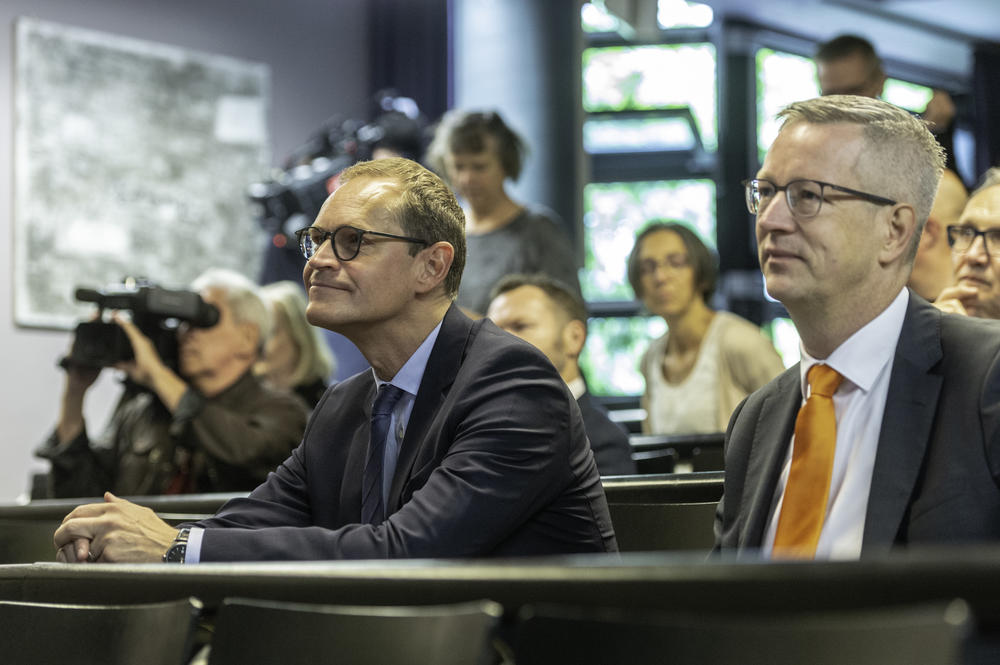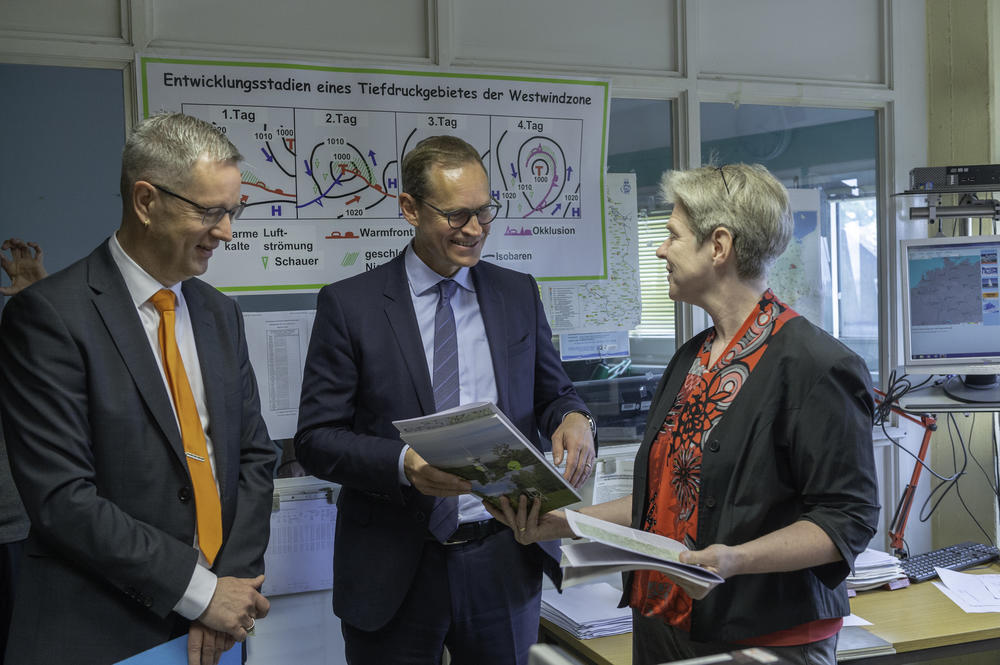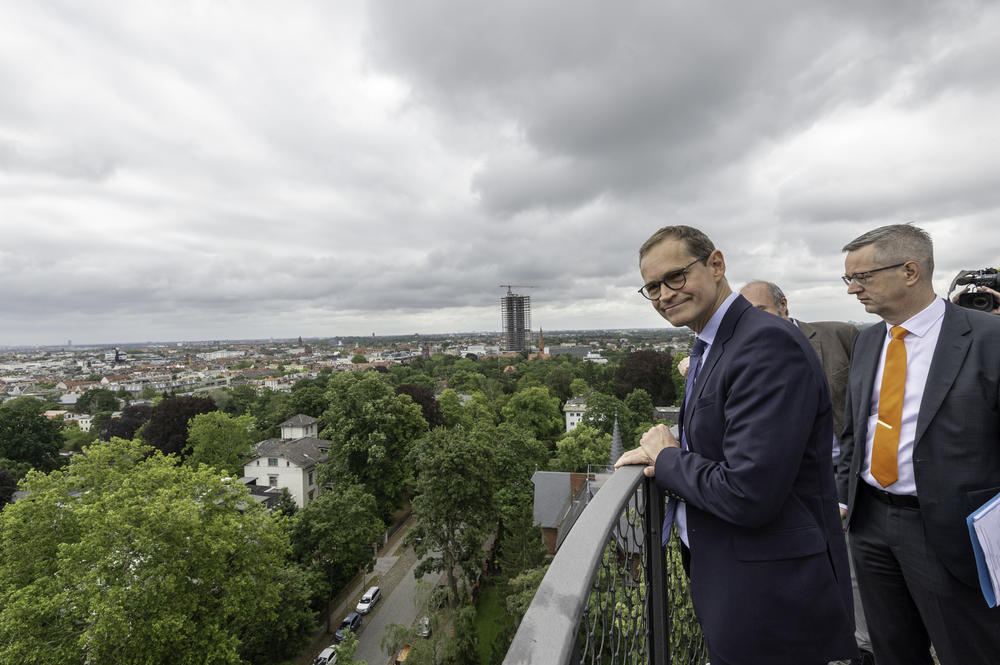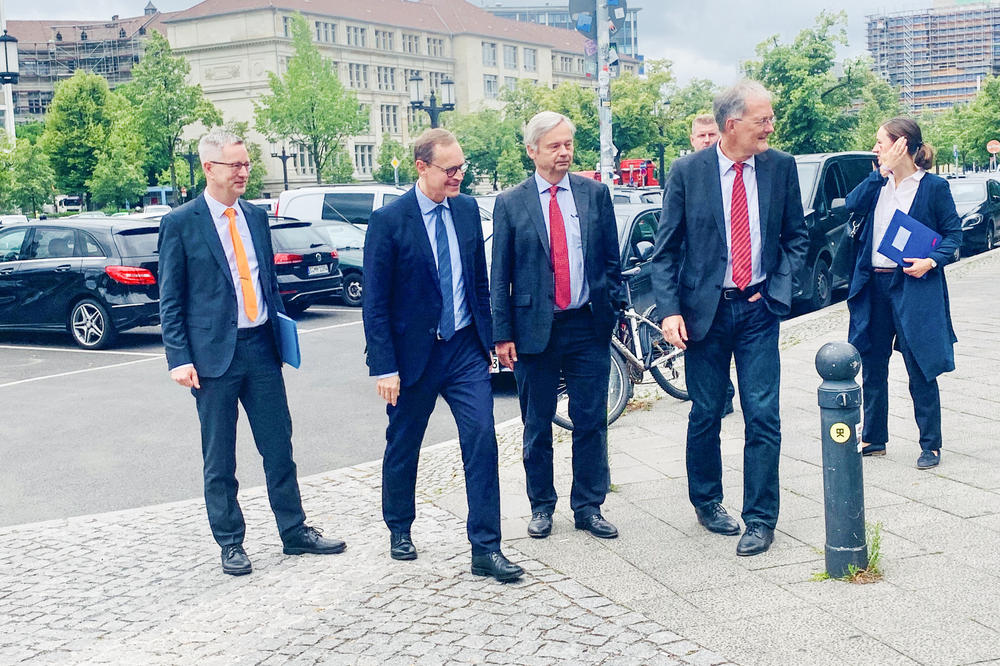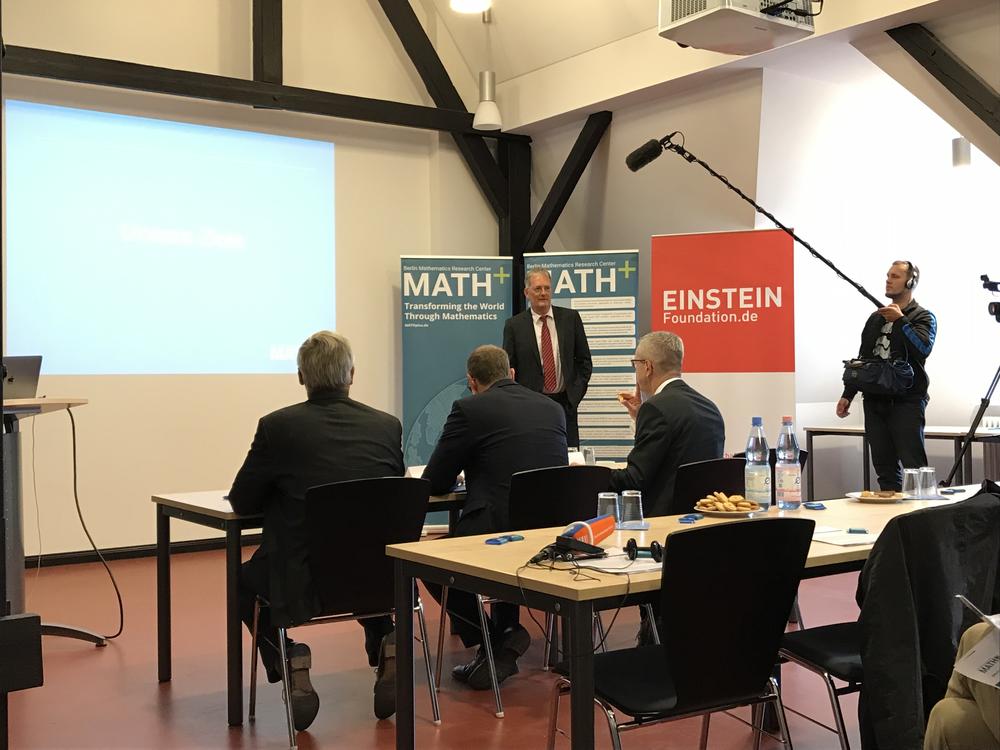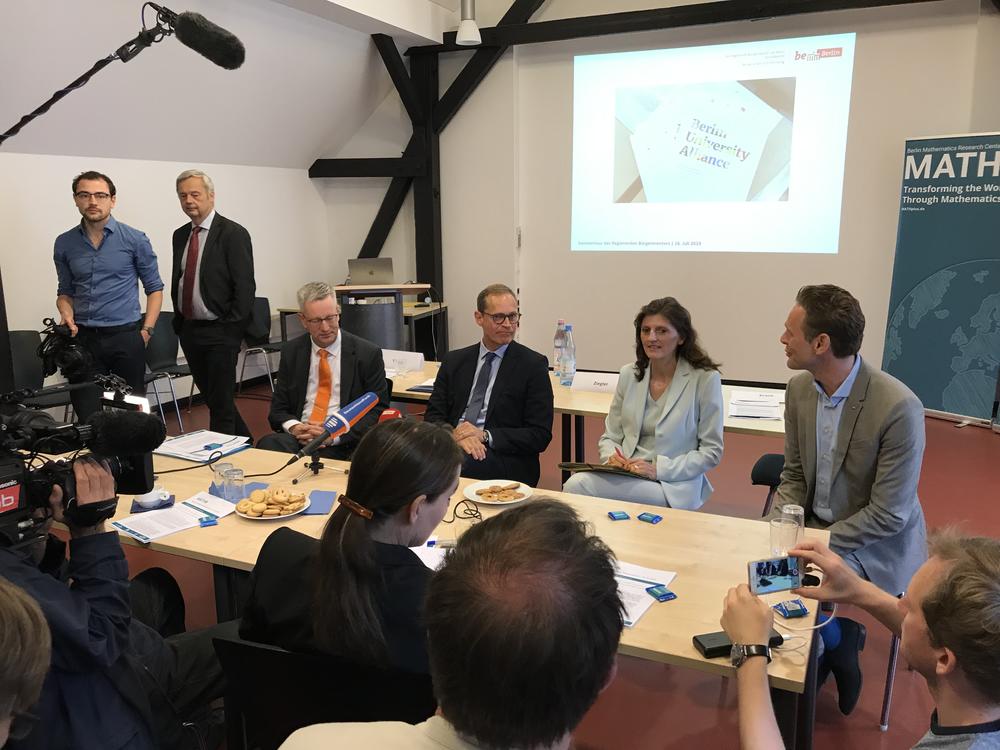Promising Outlooks
Berlin’s Governing Mayor Michael Müller visited Freie Universität Berlin and Technische Universität Berlin as part of his annual summer tour.
Jul 20, 2019
The view from above: Meteorology professor Uwe Ulbrich (center) together with Governing Mayor Michael Müller (left) and President Günter M. Ziegler atop the weather tower at Freie Universität.
Image Credit: Bernd Wannenmacher
Michael Müller, Governing Mayor of Berlin and Senator for Science and Research, began his summer tour under overcast skies and with cool temperatures. Surrounded by a large group of journalists, he is standing in front of Freie Universität Berlin’s Institute of Meteorology in Steglitz. Professor Günter M. Zielger, the president of the university, is there to greet him. The unusually cool temperatures for July are due to the low-pressure system “Rico” and the high-pressure system “Xandra.” The two systems are directing cool, wet winds from the North Sea inland toward northern Germany’s low-lying regions, as Dennis Schneider later explains at the institute’s weather tower. Schneider works for the “Berlin Wetterkarte” [Berlin Weather Map] association.
July 16, 2019, 9 a.m. sharp in Steglitz: Michael Müller’s arrival is eagerly awaited. Günter M. Ziegler, president of the university, welcomes the Governing Mayor to Freie Universität.
Image Credit: Bernd Wannenmacher
The first stop is a lecture hall: Weather observation has a long history in Dahlem, explains Uwe Ulbrich, a meteorology professor and dean of the Department of Earth Sciences. As early as 1908, scientists have been measuring weather regularly. The Institute of Meteorology was founded in 1949 at Freie Universität Berlin.
Researchers have been recording weather data in Dahlem since 1908. Professor Ulbrich gives a presentation at the Institute of Meteorology, which was founded in 1949.
Image Credit: Bernd Wannenmacher
Ulbrich describes research and teaching topics that the institute is currently working on. Weather, climate, and climate change are the big subjects, but the list goes on to include the forecast coverage, extreme meteorological events such as droughts, floods, and storms, which also affect Berlin, as well as understanding the complex interrelationships of the climate system. To this end, the institute studies past climates and develops models of future climates. The effect of solar variability on the Earth’s climate is another important research topic.
In the audience, Governing Mayor Müller and President Ziegler listen to Uwe Ulbrich’s talk on research and teaching at the institute.
Image Credit: Bernd Wannenmacher
Air quality is yet another. Scientists look at different factors that impact air quality from sources on the ground level to the troposphere, the twelve-kilometer thick layer of air above Europe where weather events take place. As part of a consortium project funded by the German Federal Ministry of Education and Research, entitled “Urban Climate Under Change,” Freie Universität and Technische Universität Berlin are working together to develop a high-resolution urban climate model for Berlin. The model is supposed to simulate interactions between temperature, humidity, turbulent air movements, UV radiation, and air chemistry within a ten-meter range. The simulation then shows the interactions over time, at different locations, and within various climate change scenarios. The goal is to provide cities with a tool that helps them better plan for and adapt to climate change.
Strong Partners, Flexible Border
Ulbrich notes that this kind of work requires partnerships. For example, Berlin’s waterworks and the fire department are involved, as well as the Research Forum on Public Safety and Security at Freie Universität and the Disaster Research Unit, both of which are located in the same building as the Institute of Meteorology.
One recurring theme throughout the visit is the necessity of flexible borders between research fields and disciplines when it comes to studying the environment and climate change. Researchers from areas as disparate as medicine and urban planning come together with the ever-important work of computer scientists and mathematicians, whose experience with large volume of data is essential to developing models of systems.
Petra Gebauer with the Governing Mayor and President of Freie Universität in the weather tower. Meteorologist Gebauer has been interested in these issues for a long time. She first got involved with the weather tower in the 10th grade.
Image Credit: Bernd Wannenmacher
Next door to the lecture hall in the weather tower, Michael Müller wants to know “What will the weather be like tomorrow?” There on the seventh floor, meteorologist Petra Gebauer’s team of researchers from the “Berlin Weather Map” association work together with Freie Universität and the MeteoGroup Deutschland company to analyze the current weather, maintain the pollen information service, and supply data for ozone warnings. Weather systems also get named here – today, the low-pressure system “Sepp” has just been assigned a sponsor and its name.
For the last 111 years, Dahlem has been home to a twenty-four-hour weather surveillance effort, known as the “Dahlemer Klima-Reihe” or Dahlem climate series. Students are largely responsible for staffing the weather observation station and supplementing the data collected by machines. Gregor Pittke, a meteorology student, has put in time and energy to support one of the longest ongoing climate series in the world. He is one of 200 bachelor’s and 50 master’s degree students, and like Dennis Schneider, the meteorologist on duty today, his interest in weather goes back to his childhood.
One last look over the roofs and treetops of southwestern Berlin before the Governing Mayor continues his summer tour and heads to Charlottenburg.
Image Credit: Bernd Wannenmacher
After a quick visit to the viewing platform on top of the weather tower, the group makes its way to the Straße des 17. Juni and Technische Universität Berlin in Charlottenburg. There Professor Christian Thomsen, the president of Technische Universität, welcomes the Governing Mayor and his colleague Günter M. Ziegler.
Arriving at Technische Universität Berlin: University President Professor Christian Thomsen (3rd from left) and mathematics professor Christof Schütte (right) greet Michael Müller and Günter M. Ziegler.
Image Credit: Steffi Terp
Christof Schütte, a professor of numerical mathematics at Freie Universität and president of the Zuse Institute Berlin, talks about the work being done in the Cluster of Excellence MATH+, where he serves as a spokesperson.
Image Credit: Susanne Cholodnicki
Christof Schütte confirms it: There is no getting around mathematics. Schütte is a professor of numerical mathematics at Freie Universität Berlin and president of the Zuse Institute Berlin. As co-spokesperson for the Cluster of Excellence MATH+, he presents the current work being done at the cluster, a joint project of the three major universities in Berlin – Freie Universität Berlin, Humboldt-Universität zu Berlin, and Technische Universität Berlin. The cluster also integrates the Weierstrass Institute for Applied Analysis and Stochastics and the Zuse Institute Berlin.
MATH+ builds on previously established structures, such as the MATHEON Research Center, founded in 2002, and the Berlin Mathematical School. The cluster has become a strong competitor with universities in the USA, such as Stanford and Berkeley, in terms of attracting students. Its draw is due to the high concentration of brilliant mathematicians working in one place as well as its 15 years of experience in research and teaching across institutional boundaries and academic fields.
Mathematics helps ... create more efficient transportation systems ...
Kai Nagel, a professor of transport systems planning and transportation telematics, and Michael Joswig, Einstein Professor of Discrete Mathematics/Geometry, both at Technische Universität Berlin, discuss research in the field of mobility. They look at issues such as: How do the people living in Germany’s nearly 41 million households get from point A to point B? What improvements can be made to complex transportation systems to make them more efficient? What about better efficiency for subway and commuter train frequency, or emergency call responses?
... improve the use of the large volume of medical data available ...
Tim Conrad, a professor of medical bioinformatics at Freie Universität Berlin, analyzes medical data as part of his work with MATH+. The goal is to develop new procedures that can process what has become a massive amount of health-related data in a useful way. However, Conrad says, there is still a lot of research to do in order to factor in information from the microbiome – that community of microorganisms living in the human body – and from the proteome – the entire set of proteins within a living organism – and from the genome as well. These methods are intended to help reduce reaction time when treating diseases in the early stages.
... prevent upsetting systems unintentionally.
In her doctoral research in the MATH+ Cluster of Excellence, Luzie Helmann studies how systems get upset or overturned. In social systems, moments when something shifts from a stable state to another state include, for example, shifts in opinion or changes in behavior within a specific group based on laws. Human beings are often behind upsets in climate change, which the doctoral candidate is investigating in terms of the human impact on the climate system, as in the case of the melting ice sheet on Greenland. Mathematical models can trace the path of transition between states and help to better understand the process, which could potentially lead to improvements that prevent upsetting processes from taking place unintentionally.
Dr. Marion Müller, managing director of the Einstein Foundation Berlin, announces the recipients of the Einstein Strategic Professorships at the press meeting. (right: Matthias Kuder, spokesperson for the Senate Chancellery – Higher Education and Res
Image Credit: Susanne Cholodnicki
The Berlin universities and Charité are hoping for stable conditions for the partnership they established in 2017 as they await news on their joint proposal for funding through the German Excellence Strategy competition. The results will be announced on July 19. Günter M. Ziegler, who is also the spokesperson for the university alliance, sees the decision as a logical extension of Berlin’s special tradition of a “culture of cooperation,” which sets it apart from other cities. The alliance, says Berlin’s Governing Mayor Michael Müller, is “the right path and the only path to tackle the major issues of today.”
Financial Support
Regardless of the outcome of the Excellence Strategy competition, the Berlin Senate has promised to invest in research over the next seven years: The university alliance will receive six million euros annually from the city. The Einstein Foundation also has good news. The Damp Foundation has offered 30 million euros to support the Einstein Strategic Professorships, which promote the professional advancement of top international researchers. The Senate has agreed to partially match the donation and will contribute another 15 million euros.
On Friday, the university alliance will host an event for the announcement of the Excellence Strategy winners with live stream at the Urania building – followed by a party. Ziegler is already sure about one thing: his playlist. He will be DJing the party together with the Chief Executive Officer of Charité Professor Karl Max Einhäupl and Vice President of Technische Universität Berlin Professor Angela Ittel. At the top of his list are “First we take Manhattan, then we take Berlin” by Leonard Cohen and The Pet Shop Boys’ “Two Divided by Zero.”
This text originally appeared in German on July 18, 2019, in the campus.leben online magazine published by Freie Universität.

